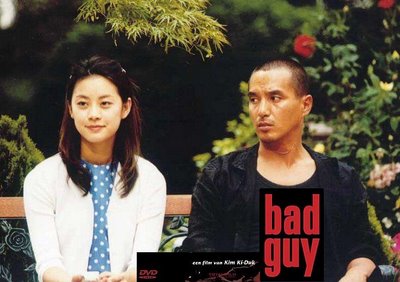
BAD GUY
Korea, 2001, 103 minutes, Colour.
Cho Jae- Hyun, Seo Won.
Directed by Kim Ki- Duk.
Kim Ki- Duk has become Korea’s best known international film director. He began writing and directing in 1996 without any formal film training – and often expresses his pride insofar as he did not come through a film school. He made a big impression in the emerging Korean cinema of the late 1990s. Films proliferated, directors’ reputations were made. Horror films abounded as well as police investigation films. Kim Ki- Duk emerges as a director who focused on the dark side of human nature, often the sadistic side, often showing his action in vivid brutality. However, he was also able to show the beauty of the Korean countryside in which so much of the action was set. He also made a number of films focusing on criminals and set in Seoul with a strong urban atmosphere. Bad Guy is one of these films.
He reached international fame with the sadomasochistic film, The Isle in 2000. He also made a big impression with Samaritan Girl and The Coast Guard. However, his more Buddhist contemplation film, Spring, Summer, Fall, Winter… and Spring showed a different side. The themes came to blend well in his imaginative Binjip (Three Iron) and Hwal (The Bow).
1. The popularity of crime films in the Republic of Korea? Their dramatisation of gangster life? Violence, sexuality? The work of Kim Ki -Duk?
2. The country locations, the city locations, the brothels, the squalor? The contrast with ordinary life in the city? Prisons? The musical score? The focus on the young student, waiting for her boyfriend, Han- Ki watching her, his coming and kissing her brutally? The boyfriend and his reaction, the clash, the girl asking for an apology, his refusal? The soldiers beating him? The set-up for what followed?
3. The character of the girl, student, her lodgings, relationship with her boyfriend, her studying of art, her financial needs? In the bookshop, taking the page from the book? Seeing the purse, taking it, the owner accosting her in the street, chasing her?
4. Han- Ki and his watching her, buying the book and later presenting it to her, seeing that she could be in debt to him?
5. The brothels, his associates, the girls in the street, the range of clients? Life in the street, day and night? Han- Ki and his taking of the girl, dominating her, forcing her to agree to be in the brothel?
6. Her life there, alone, frightened, sullen, the other girls, the woman in charge, Han- Ki's two associates? Han- Ki and his watching her? Her being forced to take the clients?
7. The gradual change, her accepting her fate, her clothes, make-up, dependent on the other women, the older woman and her care?
8. The associate attracted by her the sexual relationship? Han- Ki and his observations? The growing violence, the domination of the pimps, money exchanges, violence? The attack on Han- Ki, his getting the paper and stabbing his assailant? Their returning with the shards of glass?
9. The associate, killing, knowing that Han- Ki would get the death sentence, prison?
10. Han- Ki and his release from hospital, the associate going to jail, the other associate and his jealousy, clashes with Han-Ki?, the death?
11. The girl, the beginning of compassion for Han- Ki, her accepting him, caring for him?
12. Their going on the road in the truck, a sense of freedom, yet his setting her up in the village, the workers coming to the truck, her supporting them as a prostitute?
13. The writer-director and his knowledge of criminal life in Korea, his feel for the characters, their situation, the bluntness and crudeness of some of the presentation, the grim sense of realism?